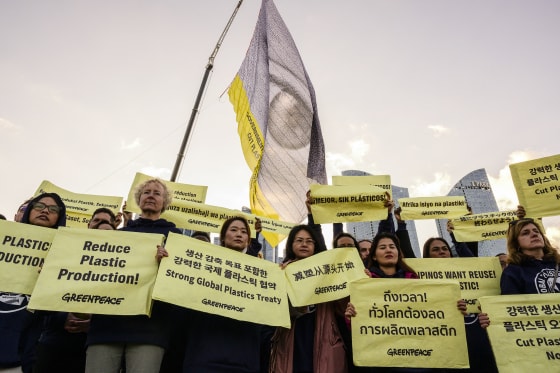
Remaining differences raise questions about whether a final deal is imminent as representatives from 175 nations convened in Busan, South Korea, on Monday for the fifth round of negotiations aimed at establishing an international convention to reduce plastic pollution.
After the previous round of negotiations in Ottawa in April concluded without a resolution on limiting plastic output, South Korea is holding the fifth and supposedly final meeting of the U.N. Intergovernmental Negotiating Committee (INC-5).
After petrochemical-producing countries like Saudi Arabia and China fiercely rejected efforts to target plastic manufacturing despite the concerns of countries that bore the brunt of plastic pollution, discussions will now be centered on chemicals of concern and other measures.
Talks over a plastics treaty are beset by divides that have long hampered U.N. attempts to combat global warming; the most recent climate summit, COP29, recently concluded with an agreement that poorer countries criticized as insufficient.
At Monday’s opening session in Busan, INC Chair Luis Vayas Valdivieso stated that if nothing is done, the amount of plastic entering the environment each year is predicted to almost treble by 2040 compared to 2022.
He stated that microplastics have been discovered in human organs and that it is about humanity rising to an existential crisis.
When the United States announced in August that it would support the treaty’s plastic production caps, aligning it with the European Union, Kenya, Peru, and other nations in the High Ambition Coalition, it caused a stir.
However, that stance has come under scrutiny after Donald Trump was elected president since, in his first term, he rejected multilateral accords and any pledges to reduce or halt U.S. production of petrochemicals and oil.
When asked if it would change its mind about supporting plastic production caps, the U.S. delegation remained silent. However, a White House Council on Environmental Quality spokeswoman stated that it is in favor of making sure that the global instrument covers plastic products, chemicals used in plastic products, and the supply of primary plastic polymers.
The U.N. Environment Program’s executive director, Inger Andersen, expressed her confidence that the negotiations will result in an agreement, citing the Group of 20 countries’ communiqué at a conference last week that called for a legally binding treaty by the end of this year.
According to Sivendra Michael, Fiji’s climate minister and lead climate and plastics negotiator, a global plastics convention is essential for a Pacific island nation like Fiji to safeguard its delicate ecosystem and public health.
Despite not generating any plastic, Fiji is responsible for the majority of its downstream pollution, he told Reuters on the sidelines of this month’s 29th U.N. Climate Change Conference.
What happens to these plastics? It ends up in our backyards, landfills, and oceans. And when plastics break down into smaller components, it has a negative influence on our health as individuals as well as the environment, he said, citing research that revealed the majority of the nation’s fish was contaminated with microplastics.
The petrochemical sector has been outspoken in its support of an international convention, asking nations to refrain from imposing obligatory plastic output limitations and instead concentrate on recycling and other methods of decreasing plastic waste.
If a pact truly focused on reducing plastic pollution, we would see it succeed. Martin Jung, president for performance materials at chemical manufacturer BASF, stated that the focus should be solely on this.
Finding funding sources to assist developing nations in implementing the pact has also been a topic of previous discussions.
In order to increase the amount of money available to developing nations looking for assistance to support their clean energy transitions and deal with the increasingly severe impacts of climate change, France, Kenya, and Barbados proposed establishing a number of global levies on specific sectors at COP29.
An estimated $25 billion to $35 billion might be raised annually if the proposal’s $60 to $70 per ton tax for primary polymer production—which is typically between 5 and 7% of the polymer price—is implemented.
The idea has been rejected by industry groups, who claim it will increase consumer prices.
Note: Every piece of content is rigorously reviewed by our team of experienced writers and editors to ensure its accuracy. Our writers use credible sources and adhere to strict fact-checking protocols to verify all claims and data before publication. If an error is identified, we promptly correct it and strive for transparency in all updates, feel free to reach out to us via email. We appreciate your trust and support!
